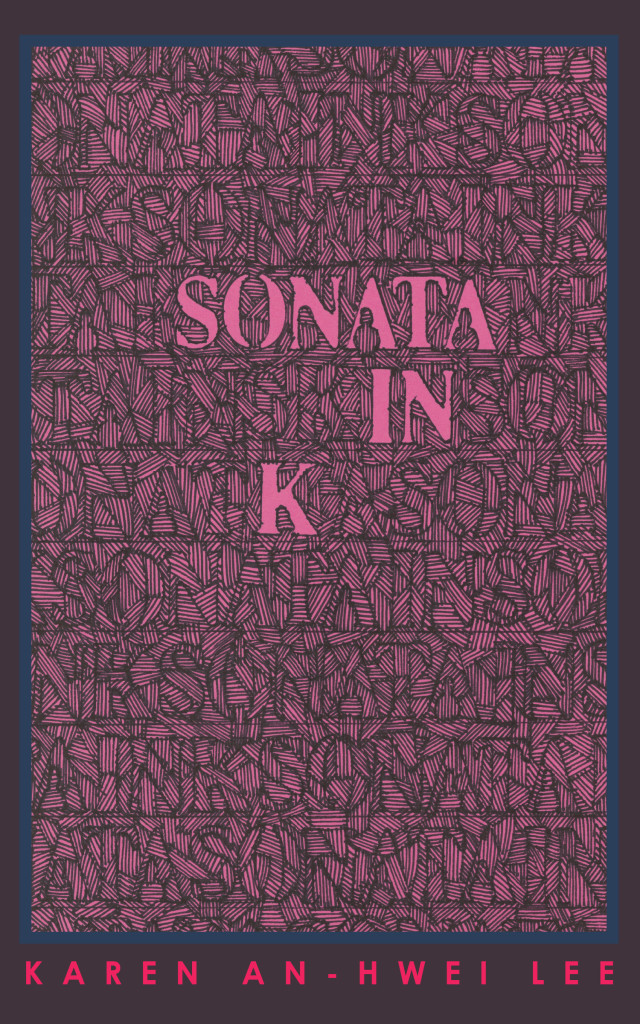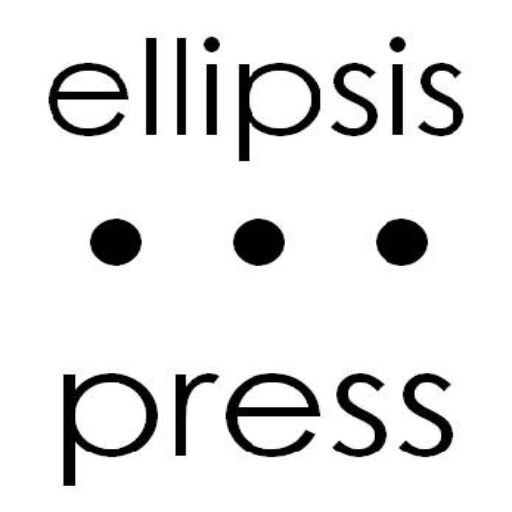
SONATA IN K by Karen An-hwei Lee
ISBN 978-1-940400-08-2 | Fiction | $14.00 | pub date: February 13, 2017
One of Entropy Magazine’s best of 2017!
We are unable to process orders here at this time… technicians are working on the problem.*
Review on Goodreads.
Read an excerpt.
Who is Kafka-san? Is he a digitally remastered hologram of the famous writer? Or a golem engineered from a finger-bone excavated from a grave in Prague? Or just your garden-variety flesh-and-blood clone? No one is quite sure, least of all K, a Nisei woman hired to be Kafka-san’s interpreter and chauffeur through millennial Los Angeles. In resplendent, incandescent prose, Karen An-hwei Lee fashions this short, strange trip out of a mind meld between the Czech fabulist of bureaucracies and a sun-hammered late-empire sprawl.
Praise for Sonata in K
What writer doesn’t pledge allegiance to Kafka? That’s why it’s astonishing when a writer comes along and actually makes Franz new, as does Karen An-hwei Lee, through her effervescent playfulness, richness of imagination, musicality, her endlessly inventive polyglot sensibility. Lee resides intimately in the space between languages, geographies, and temporalities as she pays homage to the master, as well as homage to the act of writing, of translation, of reading. The verbal and the sensual are fused under her supple pen, and you will marvel at her capacity to animate words, releasing them from habit and predictability into buoyancy.
—Mary Caponegro
Karen An-hwei Lee has produced, in elegant prose and lyric epistle, a sensorium whose richness renders appetite absurd, a roux of epicurean sensations reduced, like words on a menu, to signs and vocables. Hers is a world once removed, both familiar and exotic, like Kafka’s own fabulist universe, in which America is Amerika and Kafka is K (or perhaps not). In Lee’s elegant satiric thrust through the belly of a subtle, dangerous consumerism of language and personality, facsimiles pass for originals, time is no longer absolute, celebrity holograms have become more desirable than the individuals they represent, and Kafka is “Kafkaesque” – that is, a commodity. I heed Lee’s voice for the alarm it sounds in advance of a catastrophe as real and troubling as the San Andreas Fault and hail it for the beauty and, sometimes, comedy of its cool engagement with a “dioxide-tainted universe of nanoparticles in a roaring aquarium of steel-tentacled, inglorious ambition.” Lee has written a Waste Land for our time, whose symbolic epicenter is Los Angeles; her novella is, at once, a present dystopia and an uncanny invocation of Kafka, serving time in a penal colony where consumption and its proliferating glossaries have gone mad.
—Norman Lock
Yet despite the manifold bizarreries of lotus-eating Los Angeles—“a metropolis of unheimlich sprawl into perpetual drought”—[Kafka-san] finds the city restorative. Ms. Lee, a poet, encapsulates his reflections with exquisite delicacy and grace. Talk of used bookstores brings to mind “the toasted melancholy of aged paper.” A flock of birds pass overhead like “etudes of light.” Even the smog, coating the skyline “with a palimpsest of schmutz,” is worthy of eulogy. The ridiculous dream of Amerika seems to bring out Kafka’s romantic side. Maybe all he needed in life was a bungalow in Venice Beach.
—Wall Street Journal
Karen An-hwei Lee’s Sonata in K sits comfortably between Barnes’s Nightwood and McCourt’s Mawrdew Czgowchwz, or Nabokov’s Lolita and Theroux’s Darconville’s Cat, or Jeremy M. Davies’s Rose Alley and any of Mary Caponegro’s collections: books foregrounding vivid, clever, and audacious prose, a dense, neo-baroque textual surface, where everything is heightened, elaborate and elaborated, but without ever coming across as labored. Speaking of Nabokov, he once stated that a writer combines storytelling, teaching, and enchanting “but it is the enchanter in [them] that predominates and makes [them] a major writer.” Lee enchants in SONATA IN K, expertly drawing a fabulist portrait of Franz Kafka, who’s either been cloned from a bone fragment from exhumed remains or a corporealized hologram derived from photographic portraits. Kafka’s been summoned to Los Angeles—a “radiolucent subterranean garage”—to work on a screen adaptation of an alleged work of his, Lee deftly weaving together deadpan dialogue, poetry, recipes, bits of German and Japanese, and excerpts from Kafka’s letters, all playfully shedding new light on the famed absurdist’s doubts, quirks, phobias, and familial tensions.
—John Madera
Sonata in K is a finely crafted intellectual novel packed with lush and decadent language that brings the 20th century Czech writer back to life in tender detail. The prose possesses an elevated, intellectual quality to it that never wanders too far into abstraction and always dazzles.
—Angel City Review
The vortex of the “plot” is: what is Kafka? Is he a digital reproduction or a genetic one? Indeterminacy also serves as both the setting, which is rendered ecstatically, and the half-visible narrator, K, maybe a ghostly stand-in for the mercurial city itself . . . L.A. in Sonata in K is sound and light caught in Lee’s giddily unstable language.
—Your Impossible Voice
Summoned to twenty first century Los Angeles by an enigmatic director-producer duo to work on a film, Kafka relies on K, his Japanese-American interpreter and the novel’s narrator, to help him make sense of the intervening years since his untimely death … In Lee’s contemporary “Amerika,” we are all hunger artists, condemned, like the titular protagonist of Kafka’s short story from 1922, to starve for lack of a sustenance we search for but never find … [A c]loser reading reveals another side to the Kafkaesque, one that Lee weaves into her narrative subtly, culminating in an unlikely escape from both the Hollywood machine and the more familiar angst associated with her central character. This is the Kafka on display in one of the letters to Felice Bauer, his sometime fiancée, in which he declares “I have no literary interests, but am made of literature. I am nothing else, and cannot be anything else.” Perhaps it takes a poet to dramatize the stark bargain Kafka struck in order to live on through literature, line by line and image by image…
—American Book Review
Karen An-hwei Lee is the author of the poetry books Phyla of Joy (Tupelo 2012), Ardor (Tupelo 2008) and In Medias Res (Sarabande 2004), winner of the Norma Farber First Book Award. Lee also wrote two chapbooks, God’s One Hundred Promises (Swan Scythe 2002) and What the Sea Earns for a Living (Quaci Press 2014). A book of literary criticism, Anglophone Literatures in the Asian Diaspora: Literary Transnationalism and Translingual Migrations (Cambria 2013), was selected for the Cambria Sinophone World Series. Sonata in K is her first novel. She currently lives in San Diego. Follow her @karenanhweilee.
